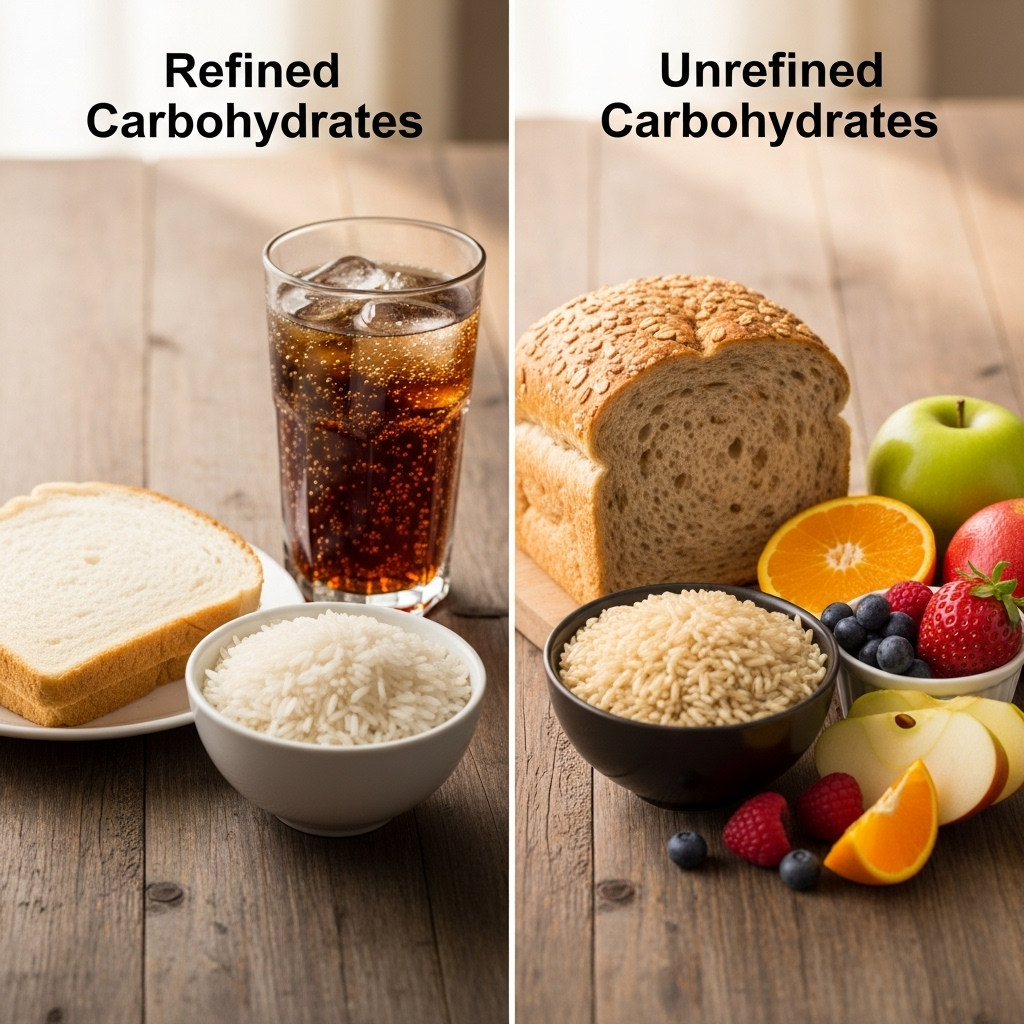In my years of exploring metabolic health and longevity, few topics have proven more crucial than understanding our relationship with carbohydrates. The modern Western diet has transformed dramatically over the past century, shifting from whole foods to highly processed alternatives that are wreaking havoc on our metabolic systems. Today, I want to explore why refined carbohydrates are at the heart of our diabetes epidemic, and provide actionable strategies to protect your metabolic health.
The Hidden Sugar Crisis
Most Americans are consuming sugar at unprecedented levels without even realizing it. The average American consumes approximately 17 teaspoons (71 grams) of added sugar daily—that's nearly 57 pounds of added sugar per year. This isn't just from obvious sources like desserts or sodas; ultra-processed foods now make up nearly 60% of the American diet, with hidden sugars lurking in everything from bread to pasta sauce to salad dressings.
What exactly are refined carbohydrates? They're essentially carbohydrates stripped of their natural fiber, vitamins, and minerals. The most common examples include:

- White flour and products made from it (bread, pasta, crackers)
- White rice
- Added sugars (sucrose, high-fructose corn syrup, etc.)
- Sugar-sweetened beverages
- Most breakfast cereals
The problem with these refined carbohydrates is their metabolic impact. Without fiber to slow digestion, they're rapidly broken down into glucose, causing dramatic spikes in blood sugar. Your pancreas responds by releasing insulin to clear that glucose from the bloodstream. When this pattern repeats multiple times daily, year after year, our cells eventually become less responsive to insulin—a condition known as insulin resistance, which is the primary driver behind type 2 diabetes.
But the dangers extend beyond diabetes. This pattern of blood sugar spikes and crashes creates a cascade of other issues:
- Energy rollercoasters: The infamous mid-afternoon energy crash is often the result of a blood sugar spike followed by a reactive drop
- Chronic inflammation: Elevated blood glucose triggers inflammatory responses throughout the body
- Increased hunger: Blood sugar crashes often trigger hunger signals, even when you've consumed plenty of calories
- Altered gut microbiome: Refined carbs can disrupt the balance of healthy gut bacteria
The "Natural Sugar" Myth
One of the most pervasive misconceptions I encounter is the belief that "natural" sugars are somehow metabolically superior to refined sugar. While honey, maple syrup, coconut sugar, and agave nectar might contain trace minerals or antioxidants, your body processes the glucose and fructose in these sweeteners similarly to how it handles table sugar.
Let's be clear: your pancreas doesn't care about marketing claims. When it comes to blood glucose impact, your body responds to the molecular structure of carbohydrates, not their origin story. Agave nectar, often marketed as a "healthy" alternative, is actually 90% fructose—higher than high-fructose corn syrup! While fructose doesn't raise blood glucose as dramatically as glucose does, it's processed exclusively by the liver and, in excess, contributes to non-alcoholic fatty liver disease.
The American Heart Association recommends limiting added sugars to no more than 25 grams (6 teaspoons) daily for women and 36 grams (9 teaspoons) for men. The U.S. Dietary Guidelines suggest keeping added sugars below 10% of daily calories.
However, in my clinical experience, these guidelines still permit sugar consumption levels that can cause metabolic dysfunction in many individuals. The truth is, there is no physiological requirement for added sugars in the human diet. The ideal amount from a purely health-optimization standpoint would be zero, though that's impractical for most people living in the modern world.
Building a Metabolic-Friendly Carbohydrate Strategy
The goal isn't to eliminate all carbohydrates—a common misconception. Carbohydrates from whole food sources play important roles in energy production, gut health, and even hormone regulation. Instead, we need to focus on carbohydrate quality and context.
Here's my framework for classifying carbohydrates:
Tier 1: Eat Freely
- Non-starchy vegetables (leafy greens, broccoli, cauliflower, asparagus, etc.)
- Low-sugar fruits (berries, avocados)
- Nuts and seeds
- Fermented foods (kimchi, sauerkraut)
These foods provide essential nutrients, fiber, and beneficial plant compounds while having minimal impact on blood glucose.
Tier 2: Eat Strategically
- Starchy vegetables (sweet potatoes, winter squash)
- Whole grains (steel-cut oats, quinoa, wild rice)
- Legumes (lentils, chickpeas, black beans)
- Moderate-sugar fruits (apples, pears, oranges)
These foods contain more digestible carbohydrates but also valuable nutrients and fiber. They can be part of a healthy diet for many people, especially when:
- Consumed after exercise
- Paired with protein, fat, and fiber to blunt glucose response
- Eaten in appropriate portions for your metabolic health
- Prepared to lower their glycemic impact (e.g., cooking and cooling potatoes creates resistant starch)
Tier 3: Minimize or Eliminate
- Refined flour products (bread, pasta, most baked goods)
- Added sugars (including "natural" ones)
- Sugar-sweetened beverages (including fruit juices)
- Processed snack foods
- Breakfast cereals
These provide minimal nutritional value while causing significant metabolic disruption.

Practical Implementation: Beyond Willpower
Successfully reducing refined carbohydrates isn't about superhuman willpower—it's about creating systems that make better choices easier. Here are strategies I've seen work for thousands of patients:
-
Measure to manage: Use continuous glucose monitoring (CGM) technology to understand your unique responses to different foods. What spikes one person's glucose may have minimal impact on another.
-
Sequence your meals: Start with fiber, protein, and fat before consuming carbohydrates. This simple change can reduce postprandial glucose spikes by 20-30%.
-
Time your carbs: If you're going to consume higher-carb foods, the post-exercise window is often optimal, as your muscles are primed to utilize glucose without requiring as much insulin.
-
Smart substitutions: Rather than feeling deprived, find satisfying alternatives:
- Cauliflower rice instead of white rice
- Zucchini noodles or shirataki noodles instead of pasta
- Berries with unsweetened Greek yogurt instead of sugary desserts
- Sparkling water with lemon instead of soda
- Almond or coconut flour instead of wheat flour in baking
-
Manage stress and sleep: Poor sleep and chronic stress both increase insulin resistance, making you more susceptible to blood sugar volatility.
-
Build metabolic flexibility: Regular exercise (particularly strength training and high-intensity interval training) improves your body's ability to switch between using glucose and fat for fuel.
The long-term benefits of reducing refined carbohydrates extend far beyond diabetes prevention. Patients who make these changes consistently report improved energy levels, better cognitive function, reduced inflammation, improved lipid profiles, and easier weight maintenance. The body's remarkable ability to heal becomes evident when we remove the constant assault of blood sugar spikes and the resulting insulin surges.
Remember that this is a marathon, not a sprint. Small, consistent improvements compound over time. The goal isn't perfection but progress—moving toward a way of eating that supports your metabolic health rather than undermining it.
Your future self will thank you for the investments you make today in your metabolic health. The dividends pay out not just in additional years of life, but in the quality of those years—maintaining physical and cognitive function well into your later decades.






